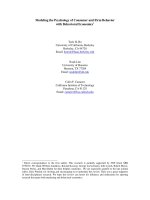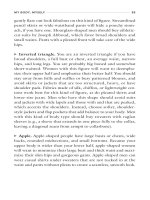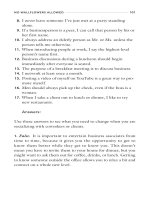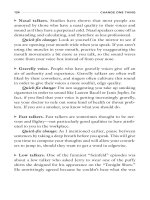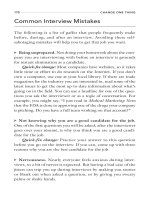How we misunderstand economics and why it matters the psychology of bias, distortion and conspiracy
Bạn đang xem bản rút gọn của tài liệu. Xem và tải ngay bản đầy đủ của tài liệu tại đây (11.57 MB, 181 trang )
“This engagingly written book takes us above and beyond traditional judgment
and decision-making studies and the heuristics and biases of behavioral economics
to explore how people develop explanatory models and concepts in the domain of
economics. It contains many fascinating insights into the challenges laypeople have
in understanding seemingly simple but deeply complex phenomena and economic
entities (e.g. money), as well as offering a bold new direction for research into a
topic where greater lay understanding has enormous social policy consequences.”
Frank Keil,Yale University, USA
“For decades economists have tidily cultivated their own scientific gardens and forgotten that complex socio-economic issues may be effectively tackled with better
knowledge of human beings on top of sophisticated equations. A plea for a multidisciplinary approach, this book is a much-needed attempt to foster dialogue and
bridge the cognitive segmentation of social sciences.”
Elsa Fornero, University of Turin, Italy
“In recent years, many economists have used psychology to understand the
economy better. In their enlightening new book, Leiser and Shemesh use psychology to explain why most people understand economics so poorly. Economics
insights often butt against deep-rooted ways of thinking about the world. And even
when the lessons of economics are intuitive, economists’ rhetoric is not. How We
Misunderstand Economics and Why It Matters is a great book for anyone who wants to
understand the economy – or explain it to others.”
Bryan Caplan, George Mason University, USA
HOW WE MISUNDERSTAND
ECONOMICS AND WHY IT MATTERS
This is the first book to explain why people usually misunderstand economic
phenomena. From the cognitive short-cuts we use to make sense of complex
information, to the metaphors we rely on and their effect on our thinking, this
important book lays bare not only the psychological traits that distort our ability to
understand such a vital topic, but also what this means for policy makers, and civil
society more widely.
Accessibly written, the book explores the range of cognitive strategies laypeople
employ when thinking about money, finance, and the wider economy. From the
intentionality fallacy, whereby all economic phenomena are assumed to have been
caused deliberately rather than to have come about by the interplay of different
factors, to the role of ideologies in framing how economic thinking is expressed,
the book discusses how we interpret important issues such as unemployment,
inflation, and how we conceive of money itself.
Exposing the underlying biases and assumptions that fatally undermine financial
literacy, and concluding with recommendations for how policies and ideas should
be framed to enable a clearer understanding, this will be essential reading not only
for students and researchers across psychology and economics, but also anyone
interested in progressive public policy.
David Leiser is Full Professor of Economic and Social Psychology at Ben-Gurion
University of the Negev, Israel. He is Past President of the International Association
for Research in Economic Psychology, and President of the Economic Psychology
Division of the International Association of Applied Psychology. He studies lay
conceptions, especially in the economic domain.
Yhonatan Shemesh holds a BA and MA in cognitive science from Ben-Gurion
University of the Negev, Israel. His research focuses on the ways the human
evolutionary cognitive endowment affects how people think and act in the
modern world.
HOW WE
MISUNDERSTAND
ECONOMICS AND WHY
IT MATTERS
The Psychology of Bias, Distortion
and Conspiracy
David Leiser and Yhonatan Shemesh
First published 2018
by Routledge
2 Park Square, Milton Park, Abingdon, Oxon OX14 4RN
and by Routledge
711 Third Avenue, New York, NY 10017
Routledge is an imprint of the Taylor & Francis Group, an informa business
© 2018 David Leiser and Yhonatan Shemesh
The right of David Leiser and Yhonatan Shemesh to be identified as authors of this
work has been asserted by them in accordance with sections 77 and 78 of the Copyright,
Designs and Patents Act 1988.
All rights reserved. No part of this book may be reprinted or reproduced or utilised
in any form or by any electronic, mechanical, or other means, now known or
hereafter invented, including photocopying and recording, or in any information
storage or retrieval system, without permission in writing from the publishers.
Trademark notice: Product or corporate names may be trademarks or registered trademarks,
and are used only for identification and explanation without intent to infringe.
British Library Cataloguing-in-Publication Data
A catalogue record for this book is available from the British Library
Library of Congress Cataloging-in-Publication Data
A catalog record has been requested for this book
ISBN: 978-1-138-93892-2 (hbk)
ISBN: 978-1-138-93893-9 (pbk)
ISBN: 978-1-315-67534-3 (ebk)
Typeset in Bembo
by Out of House Publishing
For Geneviève
CONTENTS
Preface
1 Introduction: folk-economic beliefs
How to understand what you cannot? 5
2 Why is economics so hard?
xiii
1
10
Economists focus on the aggregate; non-economists think
of individuals 11
Direct and indirect effects 15
Equilibrium as an explanation 17
Morality 20
3 Cognitive hurdles
Cognitive structure: a flashlight in the basement 26
WM –short range 26
LTM –narrow scope 27
Thinking, fast and slow 30
The intentionality bias 30
Consequences 31
Opportunity cost neglect 33
Aggregate effects 34
Ignoring the equilibrium 34
Uni-dimensionality and the halo effect 35
The denial of tradeoffs 37
23
x Contents
4 Unemployment and inflation
Unemployment 41
40
Three causes for individual unemployment 43
Inflation 47
The central psychological core of “inflation” 49
5 The “good begets good” heuristic: the relations between
macroeconomic variables
The “good begets good” heuristic 53
Macroeconomic consequences of the GBG heuristic 57
6 What is the economy like? How metaphors shape our
understanding of economics
Metaphors as structure mapping 63
When are metaphors most influential? 65
Metaphors in problem solving and decision making 65
Economic metaphors in the media 67
The economy is an organism 68
The economy is a machine 68
The most common economic metaphors 70
Intuitive theories: the source of metaphorical sources 70
Intuitive theories at work: folk-psychology 72
Concluding remarks 75
7 Ideology: lay understanding of capitalism
Contrasting views of capitalism 79
52
60
77
Moral-psychological roots of lay views of capitalism 83
Self-interest 83
Fairness 86
Ideology and personality 90
Concluding remarks 93
8 Money and wealth
Supply and demand –money as tool 96
Money supply 98
Fiat money 101
Emotional value of money –money as drug 102
Emotions are extended to fiat money 103
Fungibility 104
Real money vs. money on paper 106
96
Contents xi
9 Financial and economic literacy
Financial literacy and education 109
109
How much financial literacy does the public possess? 110
Consequences of deficient financial knowledge 111
The promise of financial literacy training 112
Financial training is mostly disappointing 112
Correlation is not causation 114
Economic literacy to fight simplistic policies 115
Reforms and economic knowledge: Elsa Fornero 116
Literacy and public policy 118
In praise of informed skepticism: Peter Davies 119
Final words 121
10 Public policy consequences
The mismatch 122
Consequences 126
Recommendations 129
Personal finances 131
Governance 134
122
References
Index
137
160
PREFACE
This book is the first to explore how the general public understands economics,
or rather, how it systematically misunderstands it. Economics has developed such
advanced and unintuitive ways of thinking that ordinary people without proper
training simply cannot grasp it.Yet they are expected, by others and by themselves,
to do so.We marshal a wide range of principles and insights, coming from cognitive,
social, and political psychology, to identify the tools laypeople can bring to bear to
achieve a semblance of comprehension.
This preface will remain brief, but there are two comments that we wish to
make. In discussing the specificities of lay understanding of economics, we use neoclassic economic theory as a reference, and hope this will not annoy proponents of
alternative currents. Convenience and familiarity guided our choice, and as humble
psychologists we are in no position to endorse a particular school. More importantly,
we submit that, had this book been written by a Libertarian or a Marxist, most of
our points would have been unaffected, or only slightly amended. Additional kindred points can no doubt be formulated and explored, and if this book serves to
encourage such investigations, we would be delighted.
The second comment is that our perspective owes much to the work of Jean
Piaget. Laypeople don’t understand much of what economists are talking about,
while economists don’t get what there is to understand, and are frustrated at the
public’s failure to see the obvious. In the body of the text, we avoided making reference to the Piagetian framework, because it is foreign to most of our expected
readers, but here, we would observe that the mismatch and mutual incomprehension between laypeople and economists is analogous to that between one Piagetian
stage to the next. Another helpful framework is to consider that gap as that between
two Kuhnian paradigms. The two are closely related: Thomas Kuhn made a point
of acknowledging how Piaget’s work had influenced his own, and when I went to
meet him in the course of a sabbatical at MIT, he presented me with a book, and
newgenprepdf
xiv Preface
stated that the paper on Piaget it includes (Kuhn, 1977) was “the best thing I ever
wrote.”
Piaget and Kuhn were united in their view that describing deficient knowledge
only as a failure to attain the normative form is insufficient. A proper account must
strive to analyze how the incomplete knowledge is structured in its own terms. We
too attempt to describe how people think, as opposed to measuring the extent to
which laypeople fail, or documenting points of disagreement between the general
public and trained professionals. It is gratifying to acknowledge this filiation to the
work of my erstwhile “patron.”
It is with great pleasure that we acknowledge the help and encouragements
of many: Carmela Aprea, Meir Bing, Ivo Bischoff, Bryan Caplan, Eyal Carmel,
Nofar Duani, Elsa Fornero, Zeev Kril, David Laibson, Shabnam Musavi, Tobias
Rötheli, Michael Sarel, Robert Shiller, Avia Spivak, Nicolas Weill, and Eyal Winter.
Amongst “those without whose” (Booth, 1974), I am especially grateful to Bill
Congdon, whose many insightful comments were particularly helpful and set my
mind thinking about policy implications. I also wish to thank Rector HaCohen
and Ben-Gurion University for granting me an extended sabbatical, and to Sacha
Bourgeois-Gironde and the Department of Economics at Paris II (Panthéon-Assas)
for inviting me to work on this book in a pleasant and stimulating environment.
David Leiser
1
INTRODUCTION
Folk-economic beliefs
If I were to pick the field of economics I am most anxious to see adopt
behaviorally realistic approaches, it would, alas, be the field where behavioral
approaches have had the least impact so far: macro-economics.
(Richard Thaler, 2015, p. 349)
Economists, especially those who formulate public policy, often express dismay at
the failure of the general public to understand economics. This is not a matter of
ignorance as in the way non-specialists cannot say much about the workings of,
say, the spleen. No one expects us to possess extensive knowledge about this fine
organ. We are not exposed to any information about it nor do we engage in any
conscious interaction with it. Just the reverse holds for economics. People do hold
beliefs and entertain hunches about economics, but much of them are systematically misguided. This book will document lay beliefs about economics and try to
expose their sources.
Why is this important? Because people’s economic views have practical
consequences. Whereas what you think about your spleen doesn’t affect it in any
way, economic beliefs guide people’s behavior (think of inflation expectations) and
figure in economic models. Further, the general public’s beliefs also affect public
policy, especially in democratic regimes. The authorities ignore the views of the
public at their peril, and if the policy measures they put forward are misunderstood or disliked, they may be difficult or impossible to implement. It is therefore
extremely important to map the public’s understanding of economics, and to consider what it implies for public policy. A recent poll (IGM Forum, 2017) asked two
panels of respected economists in the US and in Europe whether “Insights from
psychology about individual behavior –examples of which include limited rationality, low self-control, or a taste for fairness –predict several important types of
observed market outcomes that fully-rational economic models do not.” All the US
2 Introduction: folk-economic beliefs
experts and 88% of the European ones agreed that this is the case. George Stigler
(1970, p. 61), who was awarded the Nobel Prize (inter alia) for highlighting the
importance of information, turned his attention to economic knowledge:
Why should people be economically literate, rather than musically literate, or
historically literate? … The citizen of a democracy is called upon to judge
public policy in a thousand directions –military, educational, medical, economic, and recreational, for example –and he will make better decisions if
he is well-informed.
Understanding by the public is of particular importance for Central Banks, who
rely on transparency to convince the public that they will control inflation and are
committed to their targets, and to that end routinely make all relevant information
and considerations public. Ben Bernanke, then Chairman of the Federal Reserve’s
Board of Governors, was well aware of this:
The Federal Reserve’s mission of conducting monetary policy and maintaining
a stable financial system depends upon the participation and support of an
educated public. As the Fed pursues the monetary policy objectives … it is
essential that the public understand our objectives and our actions. Educating
the public about the reasoning behind our decisions helps build confidence
in our economic system.
(Bernanke, 2006)
This is not just a matter of knowledge or ignorance: misunderstanding exerts its
toll. Alan Blinder, an economist with major experience in both the Federal Reserve
System and the US administration, discussed how the simplistic views of the general public raise difficulties for running delicate policies:
There is apparently something in the American character that rejects any
remedy too complex to be emblazoned on a T-shirt. … this leads to simplistic
solutions. Sometimes those are from the left, sometimes those are from the
right. … Too many American kids are brought up without any basic literacy
in economics. I don’t mean knowledge of fancy economic theory, I mean
fairly elementary things like “demand curves usually slope down” … if you
are in the political arena, you can’t ignore T-shirt attitudes as easily as you can
when you are in an apolitical arena.
(Blinder, interviewed in Erickson, 1994)
Psychology and economics have been fruitfully engaging for decades. Extensive
work has taken place in Behavioral Economics, mostly concerning decision making
by individuals. We will refrain from recapitulating the most important insights of
behavioral economics, and refer the reader to existing surveys (Ariely & Jones, 2008;
Introduction: folk-economic beliefs 3
Camerer, Loewenstein, & Rabin, 2011; Kahneman, 2011). Countless studies document the type of mistakes people make, both errors of omission and of commission.
These findings have inspired research into helping people avoid mistakes. Best
known are the attempts to “nudge” individuals to take a recommended course of
action without downright imposing it (Sunstein & Thaler, 2008; Thaler, 2015). The
newfound insights are widely being used in the attempt to develop “behavioral
public finance.” This embryonic field holds promise to expand the set of available
policy instruments by relying on realistic psychological foundations, but also opens
up the possibility of evaluating welfare with respect to a psychologically realistic
model of decision making and so provide a sounder foundation for public policy
(Congdon, Kling, & Mullainathan, 2011; OECD, 2017). Richard Thaler, the 2017
Nobel Laureate who ranks amongst the most prominent behavioral economists,
wishes macroeconomics too were psychologically informed, and laments this isn’t
taking place to any great extent.
Compared to that extensive body of work, strikingly little is known about how
people think in the economics domain, as opposed to how they decide. This neglect
of lay economic understanding is a serious lacuna. As humanity expands its environment, it becomes increasingly important to investigate how our existing cognitive and psychological endowment is deployed in understanding this broader
environment.
Psychology traditionally wasn’t interested in the question. Cognitive
psychologists mostly concentrate on the processing of limited quantities of information, such as can be encompassed in very few sentences at most, whereas the
study of how entire domains are comprehended is relatively undeveloped (Friedkin,
Proskurnikov, Tempo, & Parsegov, 2016). There are research traditions, originating
with the work of Carey (1985) and Keil (1989, 1992), who study the development
of understanding in fundamental domains such as the natural (fire, liquids, weather),
biological (health and disease, organisms), physical (material objects, forces), and
psychological/interpersonal realms of life, all domains where cognitive preparedness developed to benefit our forebears (Pinker, 2003; Shtulman, 2015). But, as
Pinker notes, economics as it developed over the last centuries never benefited
from such preparedness, and perhaps for this reason, the psychology of economic
understanding wasn’t considered an interesting psychological question. Recently
Boyer and Petersen (in press) upended this insight to great benefit. These authors
take domain-specific systems identified by evolutionary psychology (such as cheater
detection, ownership intuitions, or coalitional psychology) and that evolved to the
benefit of our evolutionary ancestors to enable coordination between them, and
then trace how those play out in our current environment, leading to biases in
folk-economics.We take a complementary perspective, and relate misunderstanding
to the limited cognitive resources available to individuals who struggle to make
sense of the modern economic environment. Much of this book involves relating
the cognitive and psychological features of humans to characteristics of economic
thinking, in an attempt to account for how ordinary people cope with it.
4 Introduction: folk-economic beliefs
And the fact is, they cope very poorly. Economists, frustrated by the failure of
the public to grasp what they see as obvious economic realities, sometimes try to
speak to the public and to explain what they are doing and why, only to be met
with incomprehension or suspicion.
They typically do not realize the magnitude of the obstacle. Blinder also
remarked: “I think the economists, with some exceptions, don’t help a lot in
that they spend precious little time talking –and I guess that means through the
media –to ordinary people in ways that ordinary people can understand” (Blinder,
interviewed in Erickson, 1994). Apparently, he believed that if only economists were
to take the trouble to explain matters to the public, things would go much more
smoothly. That naïve hope was shared by Valery Giscard d’Estaing. On February 10,
1972, while France’s Finance Minister, he invited himself onto a talk show1 because,
as he put it: “I am responsible for the French tax system. I would like everyone
to understand our tax system, and to a certain extent, approve it.” Whereupon he
stepped up to a flip board and explained the arcane principles of the now defunct
“l’avoir fiscal” concept (tax credits linked to dividends paid to shareholders of French
companies subject to corporate tax).2
A little fireside chat with the public will accomplish nothing, because members
of the public understand economic matters very differently than economists do, and
the mismatch is deeply rooted in our cognitive abilities. The coming chapters discuss this mismatch in detail, and show why numerous specific tensions arise.
But this covers only half our purpose. Failing to understand economic concepts
and reasoning does not paralyze the public. On the contrary, a conspicuous feature
of lay discourse about economics (the proverbial bloke in the pub) is that people
speak confidently of policies and economic events. How can this be? Later chapters
will discuss several means that enable them to be both confident and uninformed.
Economics is not a theoretical discipline that concerns academics only. There
are social pressures on individuals to have economic views. Because the issues affect
people so much, they are often debated in social settings, and everyone who is anyone
should have a view. For the same reason, economic issues are frequently discussed
in the media. News pieces on the current state of the economy, the consequences
of policy changes or the goals pursued by those who formulate them, are routinely
addressed to the general public, implicitly conveying to its members that they are
expected to grasp them. Newscasts and the written press will discuss whether the
present time is a good time to buy a house and why, the reasoning behind the latest
decisions by the central bank governor and their likely consequences, or the economic significance of “Brexit” (UK withdrawal from the European Union). This
state of affairs is unlike that observed in other domains: news programs do not
invite civil engineers to talk about the precise technical mishap that caused a bridge
to collapse, as no one expects laypeople to be able to follow the explanation. But
in the economic domain, the corresponding information is conveyed to the public.
Here is a curtailed example at random, taken from the Orange County News, entitled “What a Fed rate increase could mean for you” (www.nerdwallet.com/blog/
finance/what-a-fed-rate-increase-could-mean-for-you/)
Introduction: folk-economic beliefs 5
Home sales
Rising interest rates generally put downward pressure on the demand for
homes and home prices, at least in the short term. So if the Fed raises rates,
you may not see very many “For Sale” signs in front yards for a while.
This might make you nervous if you’re planning to sell your home soon. …
Bonds
Interest rates and bond prices move in opposite directions. When interest
rates go up, bond prices go down. If you’re thinking about selling your bonds
before they mature, higher interest rates will work against you. …
Stocks
The effect of rising interest rates on stock prices is a little murkier than its
effect on bonds. Stock prices generally decrease when interest rates go up, but
that’s not always the case. If we’re in an economic expansion when rates rise,
more often than not, stocks go up. …
Hiring and income
By keeping rates low, the Fed hoped to encourage economic growth, which
is often measured by employment numbers. If the Fed does raise rates, it
would be a signal that employment is recovering, and firms are hiring.
The author, Jeff Bogart, tries to accomplish what the title announces, and spells out
how a rate increase by the Fed affects ordinary people, their savings, and their jobs.
By publishing such a column, the newspaper implies that its readers are expected to
grasp it, and the readers to conclude that they ought to understand this stuff.
Can they really, though? Bogart’s text is typical of such columns: it includes
some intelligible claims (a rising rate means that firms are hiring), but these are
interspersed with statements such as “Stock prices generally decrease when interest
rates go up. If we’re in an economic expansion when rates rise, more often than
not, stocks go up.” Non-economists cannot understand such connections properly.
Indeed, although this is a topic that has not been studied, preliminary work we’ve
done strongly suggests that most people don’t quite know what the Fed does or
what interest rates are involved. Understanding of the banking system is extremely
defective and as far as the public is concerned, the Fed moves in mysterious ways
its wonders to perform.
How to understand what you cannot?
Laypeople, who are faced with the assumption that they can –and ought to –
understand those issues, try to make sense of them the best they can. And when they
don’t succeed, they often feel guilty. In a new and as yet published study involving
6 Introduction: folk-economic beliefs
Not at all, 8%
Very much, 20%
A little, 15%
Significantly, 33%
FIGURE 1.1 Do
Moderately, 24%
you feel guilty you don’t understand more?
a nationally representative sample in Israel, we asked participants whether they felt
guilty for not understanding the pension system better. Only a quarter of them
reported experiencing little or no guilt (see Figure 1.1).
Retirement savings are a complex issue that featured extensively in the news
over the last few years, and people were constantly warned that they must watch
their savings to make sure they will be adequate.
In other domains, they don’t always feel bad. Indeed, sometimes they think it is
all very simple. In late 2015, Yánis Varoufákis, the former Greek Finance Minister,
participated in the popular TV program Question Time.3 One member of the public
declared he could not understand why politicians complicate things unnecessarily.
“Economics is really simple,” he claimed: if he were to spend more than he earns,
he would soon get into serious financial difficulty, and the same holds for the state.
“It’s not difficult, guys.”
This is a wonderful example of the Dunning–Kruger effect (Dunning, Heath,
& Suls, 2004; Ehrlinger, Johnson, Banner, Dunning, & Kruger, 2008; Kruger &
Dunning, 2009). Poor performers grossly overestimate their performances because
their incompetence deprives them of the skills needed to recognize their deficits. In
this case, the man in the audience had no understanding of the difference between
the budget of a household and the state’s budget, and was blissfully unaware of the
complexity of the topic. Varoufákis’ answer was that the two cannot be compared
because “in a country, total expenditure equals total income.” This is a fundamental
equation, indeed a tautology to the economically trained, but one that left the questioner more than a little befuddled.
People are but rarely countered by a trained economist. What, then, determines
their views when knowledge is lacking? How can people pronounce themselves
about economic issues that they understand so poorly? There are a number of
ways to do so, some of which we will cover in the coming pages. One way economic opinions are determined is by inner, psychological factors. That opinions
don’t require detailed knowledge in order to be held can be illustrated by a recent
study. Leiser, Duani, and Wagner-Egger (2017) presented about 300 laypeople in
Introduction: folk-economic beliefs 7
TABLE 1.1 Various takes on the stock market
Stock markets …
1) … are a necessary tool, a mechanism that allows for sophisticated financial activity
which is an indispensable component of modern economies (“Economics 101”)
2) … have evolved uncontrollably in the past decades and the government is not acting
vigorously enough to regulate their activity (government malfunction)
3) … are easily manipulated by the select few who can influence them via speculation,
causing many small players and individuals to lose a great deal of money (the
conspiracy explanation)
4) … are an effective way for businesses to develop but they also allow wealthy
individuals more power over the economy and over the development of other
businesses (the “bad” invisible hand)
Switzerland, Israel, and the US with possible accounts for a wide range of economic
concepts (the business sector, stock markets, globalization, etc.). The study involved
four types of accounts for economic phenomena. Each such account represents a
consistent tendency to explain economic matters in a certain way: (1) the liberal
economics textbook explanation; (2) government malfunction –the government is
to blame; (3) the conspiracy explanation –destructive outcomes are due to sinister
forces who manipulate the system; and (4) the “bad” invisible hand (uncontrolled
emergent processes sometimes lead to undesirable outcomes). Those views are not
mutually exclusive, as it is perfectly reasonable to consider that stock markets are an
indispensable component of modern economies (see Table 1.1), but also that the
government is not regulating them properly and that some unscrupulous parties
manipulate them. Accordingly, participants were not required to pick one correct
answer, but rather to rate the extent of their agreement with each statement.
Figure 1.2 portrays the correlation between any two answers (combination of
topic and view). The closer two combinations appear in the figure, the stronger the
correlation between them. To illustrate, people who agreed with the Economic 101
view on the question about Unemployment (UnemplA) tended to agree to a similar
extent with this view on the issue of Centralization (CentralizationA). Strikingly, the
extent to which individuals endorsed each of the account types was consistent across
domains. This may be seen from the way the questions cluster by view: the A’s, B’s,
C’s, and D’s tend to cluster together. People who tend to accuse the government,
or to endorse the economic textbook account, do so across issues, while those who
explain economic phenomena by appeal to occult forces do so across the board.
Further, each type of account is associated with specific psycho-social variables.
For instance, Econ101 is positively correlated with self-reported Satisfaction with
Life (SWL), Right-Wing Authoritarianism, and with the feeling of being in control
of their lives. Economic conspiratorial thinking stands apart for its links with acceptance of non-economic conspirational beliefs (such as the allegedly fake Apollo
moon landing and the claims of foul play regarding the death of Lady Diana) and
8 Introduction: folk-economic beliefs
GlobA
CreditA
StockMA
CentralizationD
EuroCrisisA
BusinessD
BanksD
GlobD
StockMD
InflationBInflationD
D
CreditB
CentralizationC
BusinessB
CentralizationB
BanksC
CreditC
BanksB
CreditD
ProtestD
BanksA
A
HousholdsD
EuroCrisisB
BusinessA
PrivA
PrivD
EuroCrisisD
B
InflationA
UnempID
GlobB
TaxA
UnemplA
CentralizationA
GovD ProtestB
StockMB
BusinessC
TaxC
TaxB
StockMC
InflationC
ProtestA
GovC
PrivC C
GovB
UnemplC
GovA
TaxD
UnempIB
GlobC
PrivB
HousholdsC
ProtestC
HousholdsB
EuroCrisisC
HousholdsA
FIGURE 1.2 Multidimensional
scaling –clustering of accounts across all topics
(a. Economics 101; b. government malfunction; c. the conspiracy explanation;
d. the “bad” invisible hand).
with the endorsement of paranormal beliefs (divination, astrology, and premonitory
dreams).
It isn’t knowledge that drives their opinions. They are moved to answer by
broader attitudes that are not specifically related to economic issues, such as how
they view politicians, their political orientation, and, with reference to the conspiratorial view, the trait called “truthiness” by Stephen Colbert: “the belief in what you
feel to be true rather that what the facts will support” (Colbert, 2005).
This suggests an insight into one of the ways ordinary people assess economic
views and explains how they can be confident of their views in the absence of
knowledge and understanding of the issues: their judgments may express their personality rather than testify to their comprehension.
In coming chapters, we offer additional perspectives on how people handle economic questions. All serve the same purpose: the public is made to feel that it
Introduction: folk-economic beliefs 9
FIGURE 1.3 On
the point of having an opinion.
Source: Dilbert © 2015 Scott Adams. Used by permission of Andrew McMeel Syndication. All
rights reserved.
should understand economics, and manages to “tolerate complexity by failing to
recognize it” (Sloman & Fernbach, 2017). In Chapter 7, we discuss ideologies as a
packaged set of socially coherent views, endorsed wholesale, which facilitates no
end the need to have some opinion. In particular, we discuss how ideologies and
personality traits interact (spoiler: ideology trumps psychology, but does not neutralize it altogether). Metaphors (Chapter 6) are another way for people to handle
the complexities of the economic world, by assimilating an intractable issue to a
familiar domain whose structure is better understood (Holyoak & Thagard, 1989).
Yet another way to cognitively assimilate economic discourse is by using some cognitive heuristic to bypass the rich and complex interactions of large sets of variables
that economic models strive to master, and reduce them to a much-simplified and
tractable pattern (Chapter 5).
The following two chapters examine the roots of the difficulty to understand
economics. We will then survey how people bridge the gap in the ways we just
alluded to. In a final chapter, we will open a discussion of the consequences of this
material for public policy.
Notes
1 www.ina.fr/video/CAF88003653.
2 The specific topic VGE chose to discuss was hardly fortuitous. It was central to the
question whether the French President Jacques Chaban-Delmas had evaded or avoided
taxes. He failed to be re-elected and was replaced by … his former Minister of Finance.
3 www.youtube.com/watch?v=YZNwdcESn90.
2
WHY IS ECONOMICS SO HARD?
The Theory of Economics does not furnish a body of settled conclusions
immediately applicable to policy. It is a method rather than a doctrine, an
apparatus of the mind, a technique of thinking, which helps its possessor to
draw correct conclusions.
(John Maynard Keynes, 1922, p. v)
Why is it so difficult for non-economists to understand the principles of economics? Part of the difficulty has nothing to do with economics per se: people
have a poor understanding of causal theories in any domain (Shtulman, 2015).
“Laypeople’s explanatory understandings are remarkably coarse, full of gaps, and
often full of inconsistencies.” (Keil, 2010, p. 826; see also Keil, 2003 and Leiser,
2001). Moreover, people are unaware of the extent of their ignorance. “We
have very little idea of how little we know. We’re not designed to know how
little we know” (Kahneman, 2011, p. 24). People will readily answer questions
about economic matters which they demonstrably understand poorly, just as
they do in other domains (Cimpian, 2015; Leiser & Aroch, 2009; Sloman &
Fernbach, 2017).
But understanding economics is uniquely difficult, as a result of particular and
acute mismatches between the distinctive complexities of economics on the one
hand and the constraints of the human cognitive system on the other.
What is it about economic explanations that make them so unintuitive? We will
discuss four interrelated features of economic accounts that raise difficulties for
laypeople:
1. the difficulties of thinking of the effects of the aggregation of intelligible
transactions on a market or the national economy;



